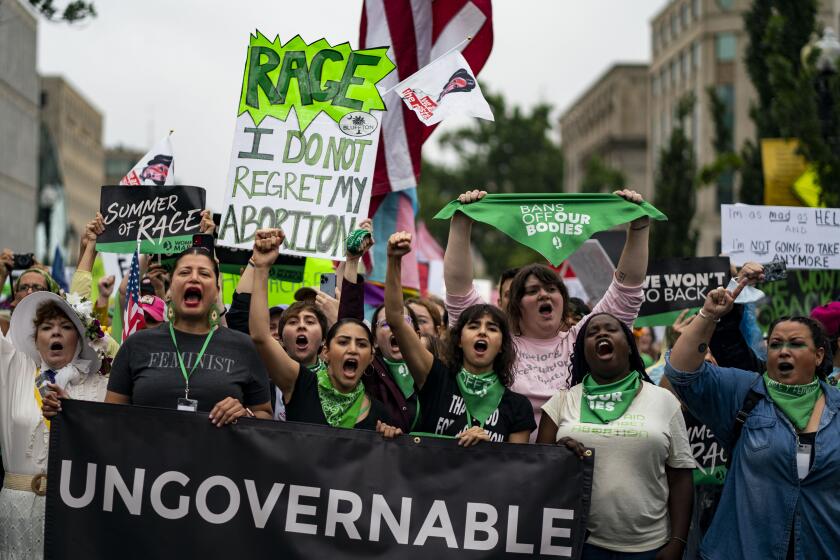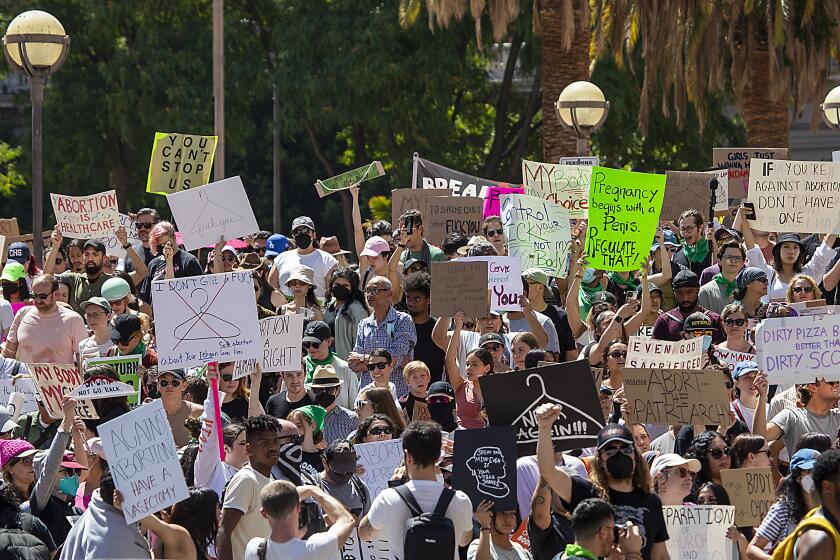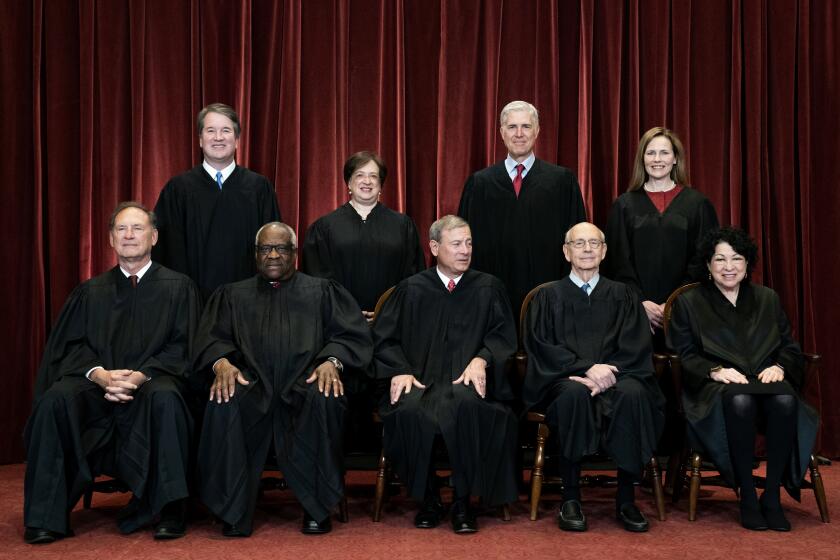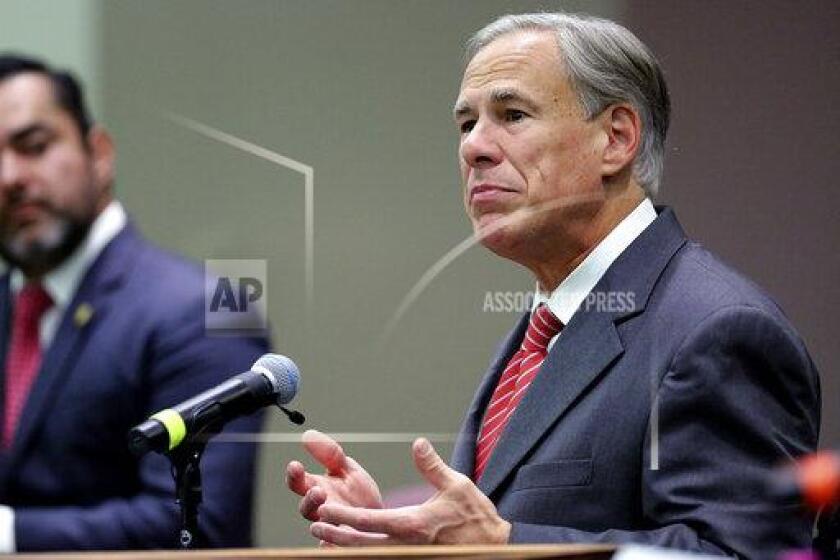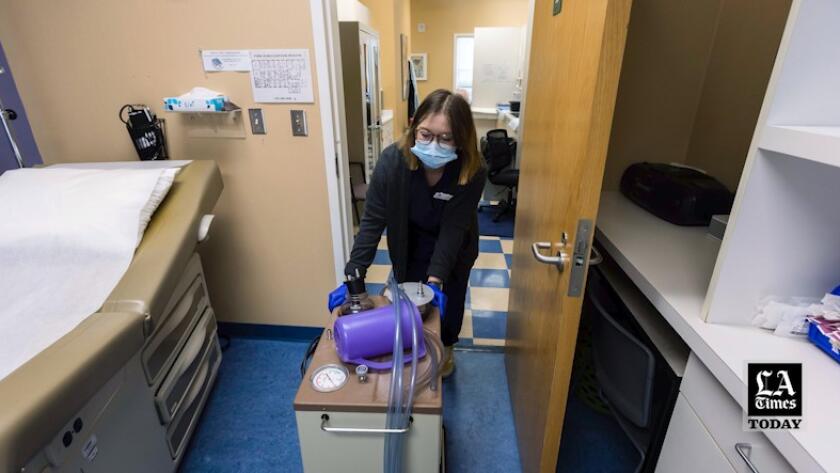Column: As professionals flee antiabortion policies, red states face a brain drain
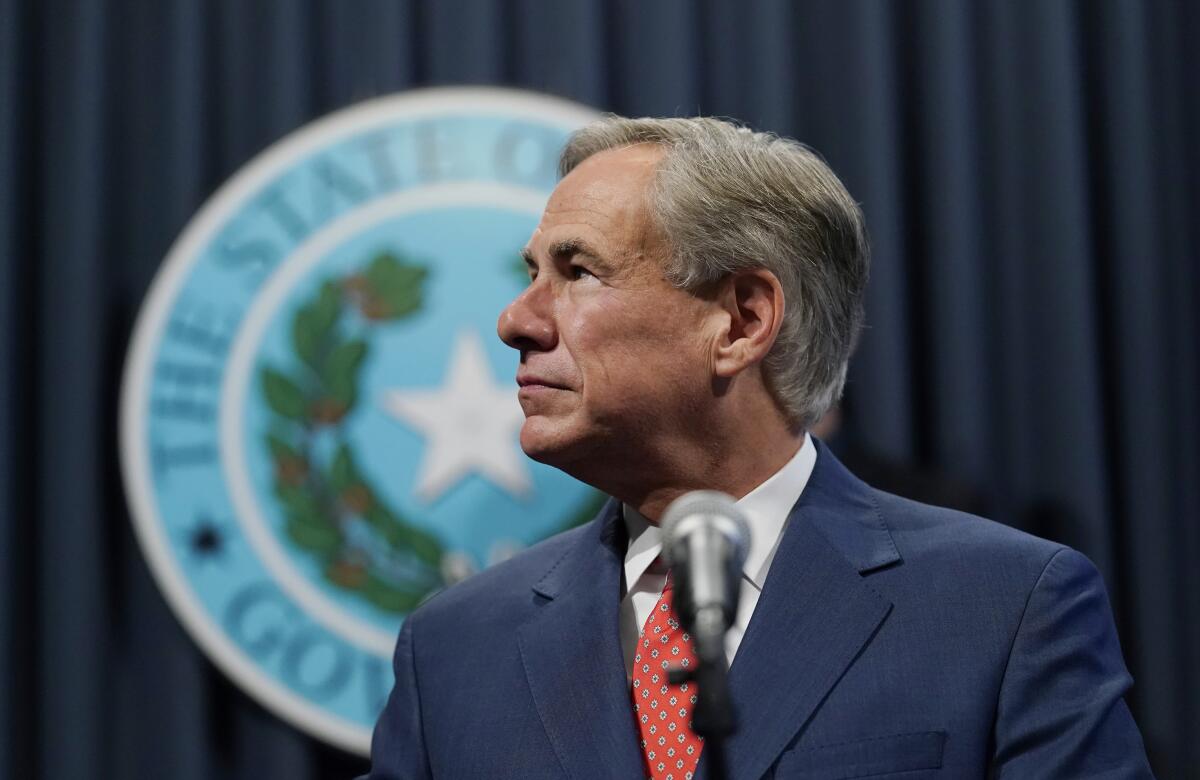
- Share via
A few days ago, a university headhunter reached out to Elizabeth T. Jacobs, a professor of epidemiology at the University of Arizona, to gauge her interest in moving to a leading university in Texas.
Under normal circumstances and in professional terms, the opportunity would have seemed intriguing. “It was an attractive situation,” Jacobs told me. “It was at an institution I have a lot of respect for, and I would not have dismissed it out of hand.”
But the political environment in Texas is not normal, in Jacobs’ view. She informed the recruiter that “under the current state leadership I didn’t think my family would be safe in that state.”
As of tomorrow, I am on the open market.... I will not endanger my team.
— University of Utah neuroscientist Bryan William Jones, following Supreme Court abortion ruling
Jacobs had a lengthy list of concerns about policies being implemented by Texas’ Republican governor, Greg Abbott.
By executive order, Abbott prohibited local government entities, including school districts and public health agencies, from issuing mask mandates. He signed a bill allowing Texas residents to carry a gun without a permit.
Get the latest from Michael Hiltzik
Commentary on economics and more from a Pulitzer Prize winner.
You may occasionally receive promotional content from the Los Angeles Times.
Texas has what may be the most draconian antiabortion law in the country. Its notorious SB 8 in effect places a bounty on the heads of medical providers and others deemed to have aided and abetted an illegal abortion, allowing plaintiffs even from out of state to claim damages of more than $10,000 for violations.
The bounty provisions “are going to dissuade the most qualified professionals from accepting jobs in places where they could be prosecuted for saving the life of a pregnant person,” Jacobs says. “Over time, that degrades the entire medical apparatus.”
Jacobs depends on the drug methotrexate to treat her rheumatoid arthritis. But because the drug can also be used to induce abortions, pharmacists in Texas can refuse to dispense it. “I can’t imagine being cut off from a medication that my doctor prescribes to reduce my symptoms.”
The Fugitive Slave Act of 1850 was America’s most detested law. Why are some anti-abortion states trying to duplicate it?
Jacobs is also concerned about the environment in which her two teenage sons would grow up — one in which gun restrictions are being loosened even in the face of mass shootings, teachers aren’t free to teach the full pageant of American history, good and bad, and in which LGBTQ residents are targeted by official policies.
“I don’t know who they’re going to become or who they’re going to fall in love with,” she says. “But I don’t want to move to a state where their options are restricted.”
Jacobs’ concerns are not unique or even unusual among professional workers. Indeed, they’re spreading. Her July 16 tweet about her encounter with the recruiter has been retweeted 7,900 times and garnered 72,600 “likes” from Twitter users.
University faculty members in red states are publicly expressing concerns about the impact of exclusionary right-wing policies on their efforts to attract students and recruit qualified people to their institutions. Some have put out public feelers soliciting job offers from states with less-restrictive abortion laws.
“As of tomorrow, I am on the open market,” University of Utah neuroscientist Bryan William Jones tweeted June 24, the day the Supreme Court overturned Roe vs. Wade, the 1973 decision that established a constitutional right to abortion. Jones said he would be willing to bring his 12 lab members, of whom eight are women, with him. “I will not endanger my team,” he wrote.
Jones noted that the Supreme Court ruling, which came in a case titled Dobbs vs. Jackson Women’s Health Organization, automatically triggered a preexisting ban on abortion in Utah. A state judge later placed the trigger law temporarily on hold, but that has only heightened the uncertainty about abortion law in Utah.
States with only 11% of the U.S. population got their way in the abortion ruling. This isn’t democracy.
The Dobbs decision cleared the way for total bans or severe restrictions on abortions in at least 25 states.
Whether or how deeply those restrictions will serve as a factor in job recruitment or university admissions is impossible to say just yet — the decision is not yet a month old and was handed down after the academic year ended in most higher- and secondary education systems.
Early indications, however, are that they may raise new obstacles to recruiting workers whose skills and qualifications allow them to choose from multiple job opportunities.
University recruiters expect the political implications of the Dobbs ruling to permeate their discussions with faculty candidates.
Quality of life is a major issue in recruitment discussions, says David Williamson Shaffer, an education professor at the University of Wisconsin who successfully hired a candidate last year who was also being wooed by Stanford and Harvard.
“We spent a lot of time discussing the quality of life here,” Shaffer told me. “As somebody who does recruiting, I have to look someone in the eye and tell them I think this would be a good place to come.”
Today, Shaffer says, “I’m not entirely sure I could do that with somebody who was of the age where they were thinking about having children.”
The Dobbs ruling triggered Wisconsin’s 173-year-old abortion ban, under which providing an abortion is a felony punishable by up to six years in prison and a fine of as much as $10,000. All Wisconsin clinics immediately suspended abortion services.
California’s role as a beacon of women’s healthcare rights is about to become stronger.
“I would have to be honest with someone even if they were past that stage of life, about what the consequences would be in terms of healthcare coverage,” Shaffer says. “It would absolutely come up in the discussion, and it would absolutely be a problem the next time I have to recruit someone.”
When a post soliciting applicants for director of information technology at the new Alice L. Walton School of Medicine appeared on Educause, a message site for university personnel, it drew numerous responses from professionals who said they would not consider taking a job in a state with antiabortion policies like those in Arkansas.
Arkansas bans all abortions with “very limited exceptions,” according to the Guttmacher Institute. Among other rules, the state restricts medication abortions — those not requiring surgery — through “unnecessary regulations,” including banning telehealth prescriptions or the mailing of pills.
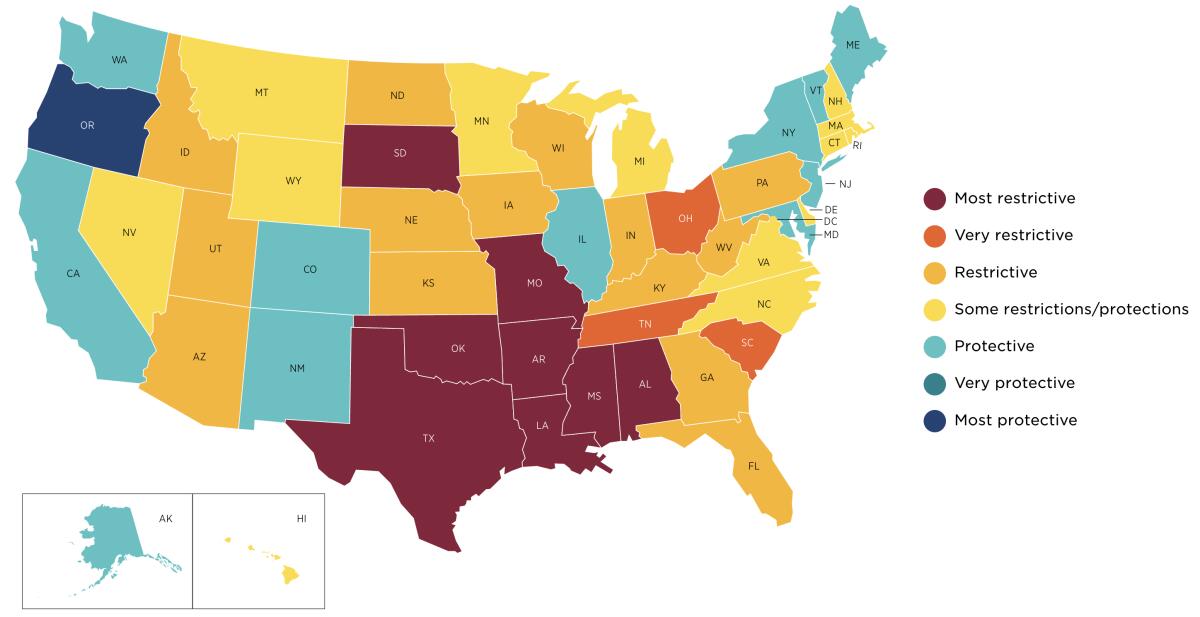
Restrictions on reproductive health care threaten to undermine initiatives in some states to attract or keep their most promising students. That may be the case in Indiana, where the privately funded Lilly Endowment Community Scholarship Program provides four years of free tuition, fees and books for successful applicants to attend colleges and universities in the state.
But that hasn’t worked out for one woman I spoke with. She said she received her Lilly scholarship in 2012, works as a marketing professional and is engaged to a medical student who was a fellow Lilly scholar. (She spoke on the condition of anonymity to avoid political repercussions.)
Now they are living in a state that, in the post-Dobbs world, could force people into pregnancy and giving birth against their will. She’s worried about data showing that states with restricted abortion access, as Indiana legislators may try to enact during an upcoming special session, have worse maternal health outcomes than states allowing the full panoply of reproductive health care.
“If I miscarry, I don’t want to fear being accused of causing it,” she told me. “If, for a miscarriage or ectopic pregnancy, I need an abortion, I don’t want to fear delayed medical care because doctors are being intimidated out of their Hippocratic oaths by the state.”
She and her fiancé are hoping to move to Illinois next year, assuming he can secure a medical residency in that state, “due to safety concerns for me as someone who can get pregnant, and for my fiancé as a medical professional,” she told me.
High school students applying for college are deleting institutions in some states from their lists of desirable destinations.
in the most extreme attack on LGBTQ+ rights in the nation, Idaho lawmakers want to criminalize transporting transgender children out-of-state
“Many students are coming to our counselors with concerns about the college lists they’ve already built or want to reconsider,” says David Santos, chief executive of Prepory, a Florida college application coaching service with its largest clienteles in Florida, California, Texas and New Jersey.
Santos says that in every case female students are the ones initiating discussions with counselors about reproductive health laws, but female and male students are raising questions about the treatment of LGBTQ residents in certain states.
Conversations between Prepory counselors and their youthful clients suggest that “students will be more influenced by geography than they were before,” according to transcripts of comments from counselors. Santos expects this to be “a regular consideration for students for years to come.”
Workers, professionals and students may well find themselves confronting a shrinking portion of the U.S. where healthcare rights and other social rights are honored. Arizona, where Jacobs works now, is poised to implement a stringent “personhood” law that “classifies fetuses, embryos, and fertilized eggs as ‘people’ starting at the point of conception,” as it’s described by the Center for Reproductive Rights.
The law has been temporarily blocked by a federal court, but if permitted to go into effect, it could subject women to criminal prosecution for miscarriages and stillbirths, according to critics.
The political environment in her home state has led Jacobs to start looking for opportunities elsewhere. “I’ve said the situation I’m in now is like jumping from the frying pan into the fire,” she says. “I’m already in the frying pan, and I’m making plans to leave Arizona as soon as I can. I just know I don’t want to move to a state with similar draconian laws.”
- Share via
Watch L.A. Times Today at 7 p.m. on Spectrum News 1 on Channel 1 or live stream on the Spectrum News App. Palos Verdes Peninsula and Orange County viewers can watch on Cox Systems on channel 99.
More to Read
Get the latest from Michael Hiltzik
Commentary on economics and more from a Pulitzer Prize winner.
You may occasionally receive promotional content from the Los Angeles Times.

